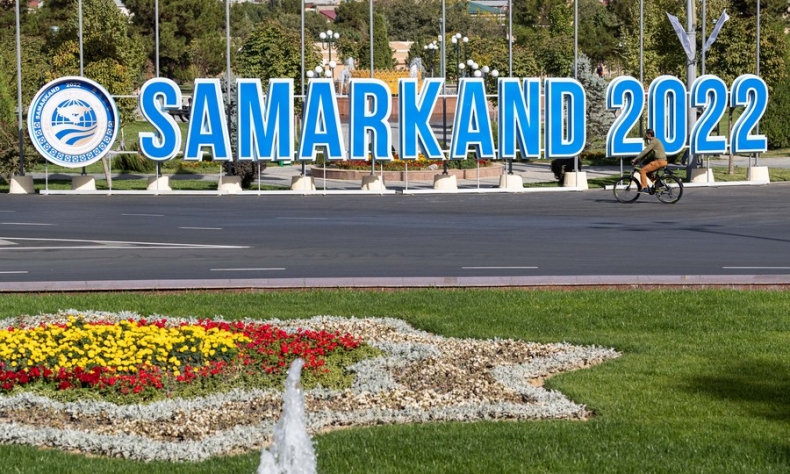Spreading the Shanghai Spirit

Looking forward, China will work with other SCO member states to make greater contributions to global and regional peace and development.
The year 2022 marks the 20th anniversary of the signing of the Shanghai Cooperation Organization (SCO) Charter and the 15th anniversary of the Treaty on Long-Term Good Neighborliness, Friendship and Cooperation Among SCO Member States. Guided by these important documents, the SCO, the first intergovernmental organization named after a Chinese city, has firmly upheld the Shanghai Spirit, promoted political mutual trust and created a new model based on partnership and dialogue, rather than alliance or confrontation, and made important contributions to fostering a new type of international relations and building a community with a shared future for humanity.
From September 14 to 16, Chinese President Xi Jinping attended the 22nd Meeting of the Council of Heads of State of the SCO in Samarkand, Uzbekistan, and paid a state visit to the host country at the invitation of President Shavkat Mirziyoyev. Xi also paid a state visit to neighboring Kazakhstan at the invitation of President Kassym-Jomart Tokayev.
China’s prioritization of this head-of-state diplomatic event on the eve of the 20th National Congress of the Communist Party of China shows the high importance China attaches to the SCO and its relations with Kazakhstan and Uzbekistan.
Twenty-year growth
The Shanghai Spirit, featuring the principles of mutual trust, mutual benefit, equality, consultation, respect for diversity of civilizations and pursuit of common development, is the core concept promoted globally by the SCO. Guided by this spirit, the SCO has transcended differences in social system, history and culture, consolidated strategic trust among members, promoted regional development and prosperity, deepened people-to-people ties and contributed to maintaining the security and stability of its member states and the region as a whole.
The SCO has been committed to maintaining the common security of member states. With combating terrorism, separatism and extremism as the core task, it has taken concrete actions to practice common, integrated, cooperative and sustainable security concepts by holding regular joint counterterrorism exercises. It has also taken tough actions to curb the spread of drug trafficking, cybercrime and transnational organized crime, while building an effective law enforcement and security cooperation network.

The SCO has actively intensified all-round practical cooperation and jointly pursued prosperity and development in the region. Its members have signed important documents such as the Program of Multilateral Trade and Economic Cooperation and the Agreement on Facilitation of International Road Transport to enhance their participation in high-quality cooperation under the Belt and Road Initiative. They have promoted synergy between the China-proposed initiative and other development strategies and regional cooperation mechanisms such as the Eurasian Economic Union. They have carried out a large number of strategic projects in connectivity, economy, trade, investment, energy and resources. People-to-people exchange programs such as art festivals, the SCO University and the SCO Forum on Traditional Medicine have also been launched.
Inheriting the Silk Road spirit of peace and cooperation, openness and inclusiveness, mutual learning and mutual benefit, the SCO has taken the lead in promoting openness and integration, advocating respect for diversity of civilizations, boosting interactions and mutual learning, and common development through inclusiveness. It has upheld international justice, taken a fair stand against hegemony and power politics, rejected domineering and bullying acts and observed the principle of extensive consultation, joint contribution and shared benefits. To translate true multilateralism into practice, the SCO has made full use of the SCO-Afghanistan Contact Group and runs projects in cooperation with the United Nations, the Association of Southeast Asian Nations and the Conference on Interaction and Confidence Building Measures in Asia.
Practices over the years have shown that the values embodied and advocated by the Shanghai Spirit have been fully recognized by the member states. The SCO has become the largest and most populous regional organization in the world with eight member states as well as multiple observers and dialogue partners.
Toward a brighter future
The SCO membership currently comprises China, India, Kazakhstan, Kyrgyzstan, Pakistan, Russia, Tajikistan and Uzbekistan.
Iran, an observer state, signed its first memorandum of obligations at this year’s summit and will obtain full membership of the organization by April 2023. Also an observer state, Belarus has been participating in SCO cooperation and has made important contributions to the healthy and stable development of the organization. China supports Belarus’ application for SCO membership, and is willing to study and make a decision together with other member states.

China welcomes more countries that agree on the Shanghai Spirit and the principles of SCO to join the organization, and holds that the SCO countries should promote the enlargement of the group in a steady and orderly manner, take into account the geographical distribution and other factors, accept more observer states and dialogue partners in addition to increasing new members, and make more countries sharing the same cooperation concepts obtain a corresponding legal status, so as to increase the comprehensive strength of the SCO and demonstrate its openness and inclusiveness. The SCO countries should strengthen mechanism building to promote more efficient decision-making, more practical cooperation and smoother coordination.
The world today has entered a new period of volatility, turbulence and transformation, with the combined impact of major changes and a pandemic both unseen in a century, the resurgence of Cold War mentality and hegemony, and constant flare-ups of international and regional hotspot issues. The task of maintaining the development and stability of all countries remains arduous and strenuous. Countries in the region jointly pursue development and promote security, and look forward to more SCO contributions and commitments.
China, as a founding member of the SCO, has been committed to promoting the development of the organization. President Xi has played an important role in its steady and long-term development,putting forward a series of initiatives to elaborate on China’s visions on development, security, cooperation, civilization and global governance. Xi has called for the building of a community of health, a community of security, a community of development and a community of cultural exchanges. All these have further enriched the Shanghai Spirit.
China holds that the profound changes in the international landscape and the protracted COVID-19 pandemic have further underscored the role the SCO plays in upholding regional security and stability and in promoting countries’ development and prosperity. As the organization enters its third decade, China is convinced that the SCO will carry forward the Shanghai Spirit, stay true to its founding mission, strengthen solidarity and cooperation, improve people’s wellbeing, safeguard fairness and justice, act on true multilateralism and improve global governance.
Looking forward, China will work with other SCO member states to make greater contributions to global and regional peace and development.
The author is an op-ed contributor to Beijing Review and an expert on international studies.
 Facebook
Facebook
 Twitter
Twitter
 Linkedin
Linkedin
 Google +
Google +










